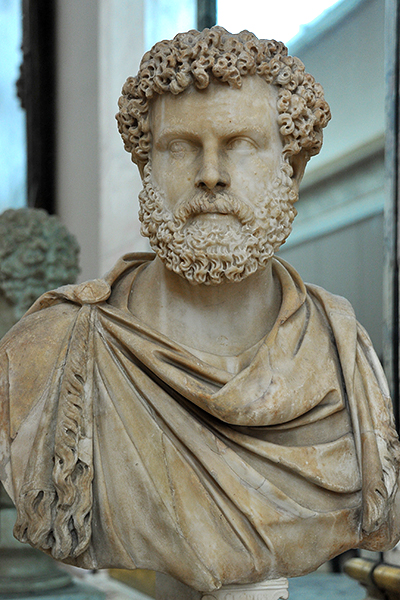
In AD 192, on the last day of the year, the emperor Commodus was strangled in his bath. Three months later, his successor Pertinax, a former governor of Britain, also was murdered and the Roman Empire offered by the praetorian guard to the highest bidder. It fell to Didius Julianus. Unpopular with the Senate and the people, who openly demonstrated against him the next day in the Circus Maximus, Julianus soon lost the support of the praetorians as well, when it became apparent that he would not be able to pay the extravagant donative he had promised them.
Nor was there support in the provinces, where the frontier legions quickly proclaimed their own respective candidates for emperor: Pescennius Niger, governor of Syria; Clodius Albinus, governor of Britannia; and Septimius Severus, governor of Upper Pannonia on the Danube.
Acclaimed emperor at Carnumtum, the provincial capital near Vienna, Severus marched on Rome, not so much as to avenge Pertinax as to succeed him. Albinus was offered the title of "Caesar," with its prospect of succession, to assure his neutrality, while Niger fatally delayed in Antioch. Julianus had the Senate declare Severus a public enemy, issued coins proclaiming himself ruler of the world, and did what he could to oppose him. With Severus advancing, however, the Senate moved that Julianus be deposed and Severus (AD 193-211) proclaimed emperor. The soldier sent to carry out the sentence found Julianus in the palace, "alone and deserted by everyone," says Herodian, and killed him "amid a shameful scene of tears." Didius Julianus had ruled only sixty-six days.
Having ordered an elaborate state funeral for the deified Pertinax, Severus then turned his attention to his rivals. Niger's army was defeated early the next year in a decisive battle on the plain near Issus, and Niger beheaded as he fled toward Antioch. So that future governors should not have the same aspirations, Syria was divided into two provinces.
Realizing that he would not succeed Severus, Albinus had himself proclaimed Augustus (emperor) late in AD 195, and crossed with three legions over to Gaul (there also was the support of one legion in Spain). The Senate, in turn, declared him a public enemy. Designating his own son Antoninus (Caracalla) as Caesar and successor, Severus consolidated his power in Rome and marched against Albinus early in AD 197. In a closely fought battle on the outskirts of Lugdunum (Lyons), the first in which Severus himself participated, Albinus was defeated and committed suicide. But, before the body was thrown into the river, together with those of his wife and sons, the corpse was trampled beneath the hooves of Severus' horse and the head sent to Rome. Britain, too, was divided into two provinces, with Londinium and Eboracum (York) as their capitals.
When Severus returned to Rome, he ruthlessly persecuted the supporters of Niger and Albinus, both of whom had been popular with the Senate and people. Twenty-nine senators were put to death, and command of the legions taken from the Senate and given to the equites. The villas estates of those who had supported Albinus were confiscated, with disruptive consequences for the trade in wine and olive oil between Spain and Britain; indeed, wine would begin to be imported from Bordeaux and the Moselle. A new procurator was appointed, who was related to Severus by marriage, to ensure that Albinus' supporters in Britain would be rooted out. There also was the restoration of a military presence in Britain, which had suffered invasion and rebellion after the withdrawal of the army to Gaul. The soldiers were awarded a stipend to assure their loyalty and allowed to live at home with their wives instead of in the barracks. The plebs were quieted with donations and more spectacles in the arena.
The civil war is discussed by Gibbon in The History of the Decline and Fall of the Roman Empire (I.v). His words are wonderful to read. Here is Gibbon's characterization of Severus, whom he considered to be "the principal author of the decline of the Roman empire."
"He promised only to betray, he flattered only to ruin; and however he might occasionally bind himself by oaths and treaties, his conscience, obsequious to his interest, always released him from the inconvenient obligation."
The bust of Clodius Severus is in the Louvre.
References: Septimius Severus: The African Emperor (1971) by Anthony Birley; The Fasti of Roman Britain (1981) by Anthony R. Birley; The Severans: The Changed Roman Empire (1996) by Michael Grant; The Roman Emperors (1985) by Michael Grant; Dio's Roman History (1925) translated by Earnest Cary (Loeb Classical Library); Herodian (1969) translated by C. R. Whittaker (Loeb Classical Library); Chronicle of the Roman Emperors (1995) by Chris Scarre; The Roman Empire (1992) by Colin Wells.